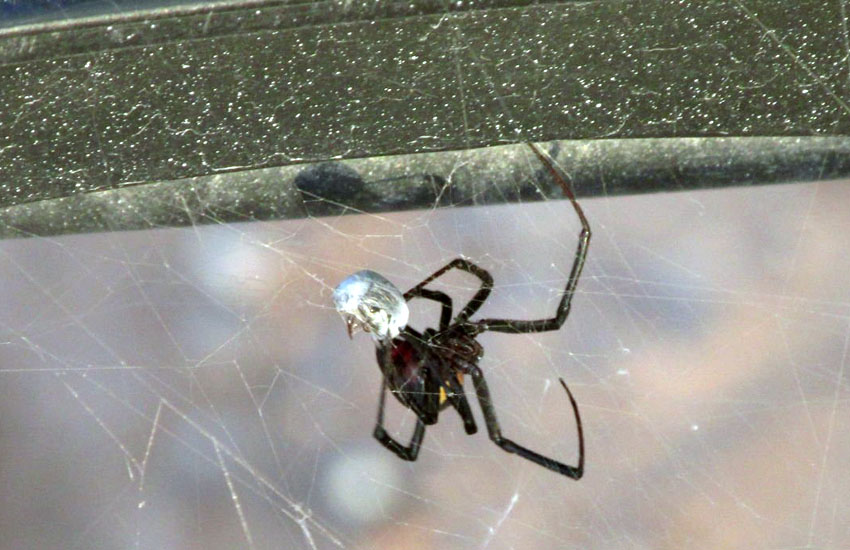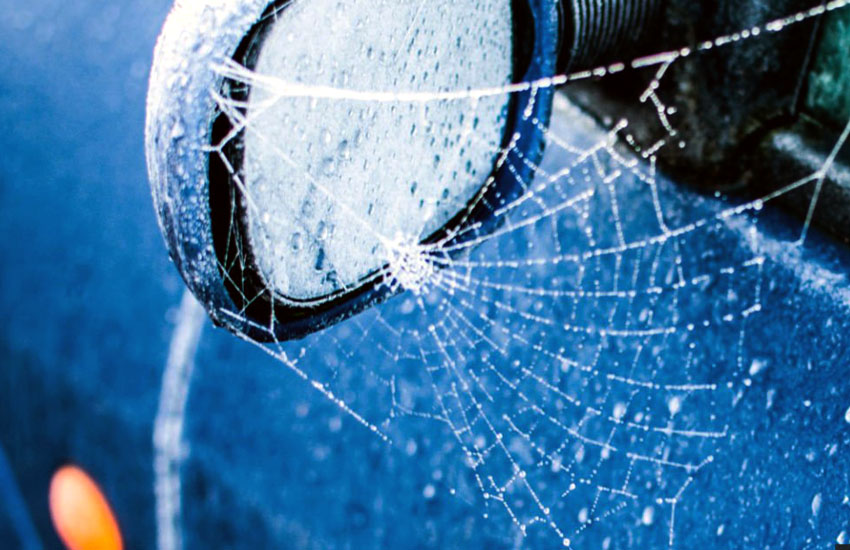Do you sometimes see creepy spiders in your car? Don’t worry, you’re not alone! Spiders can sneak into cars and surprise us when we least expect it. But fear not! There’s a simple solution to get rid of these eight-legged intruders: a chlorine bomb.
In this blog post, we’re going to talk about how you can use a chlorine bomb to kick those spiders out of your car for good. But wait, what’s a chlorine bomb? It’s not as scary as it sounds, I promise!
A chlorine bomb is a DIY solution that uses common household ingredients to create a gas that repels spiders. We’ll walk you through the steps of making and using a chlorine bomb safely and effectively.

Identifying Spider Infestation In Your Car
Signs Of Spider Presence
Spiders can easily make their way into your car, especially if it’s parked outside or in a garage. Detecting the signs of a spider infestation is crucial to address the problem before it gets out of hand. Here are some telltale indications that spiders have taken up residence in your car:
- Spider webs: One of the most obvious signs of spiders in your car is the presence of their intricate webs in corners, door frames, or even on your side mirrors.
- Egg sacs: Spiders lay eggs in sacs, which are commonly found around your vehicle’s exterior or hidden in crevices and corners.
- Shed exoskeletons: Spiders molt as they grow, leaving behind their translucent exoskeletons. Look for these remnants in areas where spiders might hide, such as under seats or in storage compartments.
- Visible spiders: If you spot spiders crawling around your car, it’s a clear indication of an infestation. Keep an eye out for their presence particularly during twilight hours when they become more active.
- Bite marks: In rare cases, spider bites may leave small, itchy marks on your skin or clothing. However, it’s essential not to jump to conclusions as bites are often mistaken for other insect bites or allergies.
Common Spider Species Found In Cars
Several spider species can find their way into your car, seeking shelter and food. Knowing which spiders are commonly found in vehicles can help you target the problem efficiently. Here are some spider species you may encounter:
Black Widow: Female black widows have a red hourglass mark on their abdomen. They are venomous, so be careful around them.
Yellow Sac Spider: These spiders have a pale yellow body and make sac-like webs. Their bites might make you feel a bit uncomfortable.
Jumping Spider: These spiders are good at jumping and are small with colorful markings. They won’t hurt you.
Wolf Spider: Wolf spiders are big and usually have a mix of brown, gray, and black colors. They’re often found on the ground. If they bite you, it might feel uncomfortable, but it’s not usually serious.
By familiarizing yourself with these common spider species, you can better identify the risks associated with a spider infestation in your car.
Understanding The Risks Of Spider Infestation In Your Car
Spiders are not just unwelcome passengers in your car; they can also pose potential risks to your health and safety. If left unchecked, a spider infestation in your vehicle can lead to unwanted consequences. It’s essential to be aware of the dangers associated with spiders in vehicles and take necessary measures to eliminate them.
Potential Dangers Of Spiders In Vehicles
Spiders can have a detrimental impact on your driving experience, as their presence may cause distractions and anxiety. Moreover, some spiders are known to build webs in car components, such as the door frames and vents, potentially obstructing visibility and functionality. This can lead to hazardous driving conditions, endangering both yourself and others on the road. Thus, it’s crucial to address spider infestations promptly to ensure a safe and stress-free driving experience.
Health Risks Associated With Spider Bites
Spider bites can result in various health concerns, ranging from mild irritation to severe allergic reactions. Some species of spiders carry venom that can cause painful and sometimes dangerous bites. If bitten by a poisonous spider, individuals may experience symptoms like swelling, redness, and in severe cases, systemic reactions. As a result, it’s essential to take proactive steps in preventing spider bites by eliminating any potential infestations within your car.
Preventive Measures To Keep Spiders Out Of Your Car
Not only can their presence startle you while driving, but they can also pose a safety hazard if you have arachnophobia. To prevent these eight-legged creatures from making themselves at home in your vehicle, follow these simple preventive measures.

Regular Cleaning And Vacuuming
Regular cleaning and vacuuming are key when it comes to keeping spiders out of your car. Spiders are attracted to clutter and debris, so keeping your car clean and tidy will make it less appealing to them.
Here are a few cleaning and vacuuming tips to prevent spiders:
- Remove any food or drink spills promptly as they can attract insects, which, in turn, attract spiders.
- Regularly vacuum the interior of your car, paying attention to the nooks and crannies where spiders like to hide.
- Use a spider removal attachment or nozzle to eliminate any webs or spider egg sacs you come across.
Sealing Cracks And Openings
Spiders can enter your car through even the tiniest cracks and openings. By sealing these points of entry, you can significantly reduce the chances of unwelcome arachnid guests.
Take the following steps to seal cracks and openings:
- Inspect your car for any visible cracks or gaps in windows, doors, or the trunk.
- Apply weather stripping or silicone caulk to seal these areas, preventing spiders from sneaking inside.
- Ensure that all windows and doors are tightly sealed when closed.
Using Spider Repellents
Spider repellents can be an effective tool in deterring spiders from entering your car. These repellents typically contain natural ingredients that spiders find unpleasant, encouraging them to stay away.
Consider using the following spider repellents:
Peppermint Oil Spray: Mix peppermint oil and water in a spray bottle. Spray it in areas where spiders might hang out.
Vinegar Solution: Combine equal parts of white vinegar and water in a spray bottle. Spray this solution on surfaces where spiders could be hiding.
By implementing these preventive measures, you can keep spiders at bay and enjoy a spider-free ride. Remember, prevention is key when it comes to addressing any potential spider problems in your car.
Safe And Non-harmful Spider Removal Methods
Are spiders making your car their new home? Don’t worry, there are safe and non-harmful methods you can use to get rid of them. In this article, we will explore various spider removal techniques that are effective and won’t harm the spiders or your car. Let’s dive in!
Manual Spider Removal
One of the easiest and safest ways to remove spiders from your car is through manual removal. Here’s how you can do it:
- Put on gloves to protect yourself from potential spider bites.
- Inspect your car’s interior, paying special attention to areas where spiders might hide, such as under seats, inside storage compartments, and in the trunk.
- Once you spot a spider, use a tissue or a paper towel to gently pick it up.
- Release the spider outside, away from your car.
This manual spider removal method is not only safe but also ensures that the spiders are relocated without causing them any harm.
Using A Spider Catcher
If the idea of manually removing spiders seems a bit daunting, you can opt for a spider catcher. These handy devices allow you to catch spiders without having to touch them directly. Here’s how to use a spider catcher:
- Hold the spider catcher near the spider, ensuring that it is within reach.
- Gently place the open end of the catcher over the spider.
- Slowly close the catcher’s lid, trapping the spider inside.
- Take the spider catcher outside and release the spider.
Using a spider catcher provides a safe and effective way to remove spiders from your car without causing them harm or discomfort.
Natural Spider Repellents
If you want to prevent spiders from entering your car in the first place, natural spider repellents can be a great option. Here are some natural repellents you can use:
Peppermint Oil Spray: Mix a few drops of peppermint oil with water and spray it around your car’s interior. Spiders don’t like the smell of peppermint.
Vinegar Solution: Mix equal parts of vinegar and water in a spray bottle. Spray the mixture in areas where spiders are likely to hide. The smell of vinegar can repel spiders.
Citrus Peels: Place citrus peels, like orange or lemon, in your car. Spiders tend to avoid citrus scents, so this can help deter them.
These natural spider repellents are safe for humans and pets, while effectively deterring spiders from entering your car.
By using safe and non-harmful spider removal methods like manual spider removal, spider catchers, and natural repellents, you can say goodbye to spiders in your car without causing harm to yourself or the spiders. Try these methods and enjoy a spider-free drive!
Dealing With Spider Infestation Using Chemical Agents
Types Of Chemical Treatments
When addressing a spider infestation in your car, there are various types of chemical treatments that can effectively eradicate these pests. Insecticide sprays specifically formulated to target spiders can be a practical solution.
They are readily available in the market and can be applied to the affected areas of the car, such as floor mats, seats, and trunk, to eliminate spiders and prevent future infestations.
Another option is chlorine bombs, which release a cloud of chlorine gas to eradicate spiders and their eggs. This method should be used with caution and in a well-ventilated area to avoid potential health risks.
Safety Precautions When Using Chemicals
When using chemical treatments to combat a spider infestation in your car, it’s crucial to prioritize safety. Wear protective gear such as gloves and a mask to shield yourself from direct contact with the chemicals.
Ventilate the car properly during and after the application of chemical treatments to prevent exposure to harmful fumes. Additionally, read and follow the instructions on the product label carefully to ensure safe and effective application.
Consulting A Professional Exterminator
If the spider infestation in your car persists despite your efforts with chemical treatments, it may be best to seek the expertise of a professional exterminator. They can assess the extent of the infestation and recommend tailored solutions to address the issue effectively.
Professional exterminators have the knowledge and experience to handle chemical treatments safely and efficiently, providing you with peace of mind and a spider-free car.
Busting The Myth: Chlorine Bomb For Spider Elimination
In the world of spider control, various methods are often discussed and debated. One such method that has gained attention is the chlorine bomb technique. However, it’s important to note that this method is not only ineffective but also dangerous and illegal. To shed light on the subject, let’s explore the explanation of the chlorine bomb method, as well as the potential dangers and legal consequences associated with it.
Explanation Of The Chlorine Bomb Method
The chlorine bomb method involves creating a makeshift bomb using common household ingredients, including chlorine bleach and other reactive substances. The idea behind this method is to release a cloud of noxious gas in the confined space of your car, which is believed to eliminate spiders and other pests.
However, there are several reasons why this method is not recommended:
- Ineffectiveness: While chlorine bleach does have some insecticidal properties, it is not potent enough to effectively control spiders. Spiders are resilient creatures that can survive in various environments, including the presence of bleach.
- Unpredictable Reactions: Mixing chlorine bleach with other reactive substances can lead to unpredictable chemical reactions. These reactions can generate dangerous gases, damage your car interior, and potentially harm you or others nearby.
Dangers And Legal Consequences
The chlorine bomb method poses significant dangers and may result in severe consequences:
- Personal Injury: Mixing and handling reactive substances without proper knowledge and protective gear can lead to chemical burns, respiratory problems, and other injuries. It is crucial to prioritize personal safety when dealing with any pest control methods.
- Property Damage: The chemical reactions caused by the chlorine bomb can damage the interior of your car, including seats, carpets, and electronics. Repairing or replacing these components can be costly.
- Legal Consequences: Utilizing a chlorine bomb or any other explosive device for pest control is illegal. Such actions can result in criminal charges, fines, and even imprisonment. It’s essential to follow legal and safe pest control practices.
When it comes to spider elimination in your car, it’s always best to rely on safer and proven methods. Regular cleaning, vacuuming, and sealing any entry points are effective strategies to keep spiders at bay. In cases of severe infestation, contacting a professional pest control service specializing in vehicle pest management is recommended.
Alternative Solutions To Combat Spider Infestation In Cars
These creepy crawlies can scuttle across your windshield, hide in the upholstery, and even startle you when you least expect it. While a chlorine bomb might seem like an extreme solution, there are alternative methods you can try to effectively get rid of spiders in your car.
Spider Traps
Spider traps are a simple yet effective solution for dealing with spider infestations in your car. These traps work by luring spiders with bait and trapping them inside, preventing them from roaming freely in your vehicle. Spider traps are safe and easy to use, making them an ideal choice for those who want to keep their car spider-free without resorting to more aggressive measures.
Ultrasonic Pest Repellers
Another option to combat spider infestations in your car is to use ultrasonic pest repellers. These devices emit high-frequency sound waves that are inaudible to humans but irritating to spiders and other pests. The ultrasonic waves create an uncomfortable environment for spiders, causing them to vacate the premises. Ultrasonic pest repellers are non-toxic and convenient, as they can be easily plugged into your car’s power outlet.
Frequent Car Usage
Frequent car usage can also help deter spiders from infesting your vehicle. Spiders are attracted to areas with minimal disruption, such as parked cars left undisturbed for extended periods.
By regularly driving your car and moving it around, you disrupt the spiders’ habitat and reduce their chances of making a home in your vehicle. Additionally, cleaning your car thoroughly and removing any potential spider hiding spots, such as clutter or debris, can further discourage them from taking up residence.
Final Words
In just a few simple steps, you can effectively eliminate spiders from your car by using a chlorine bomb. Keep in mind to follow safety precautions and ensure proper ventilation during this process. With the help of this method, you can enjoy a spider-free driving experience and maintain a clean and pest-free vehicle.


